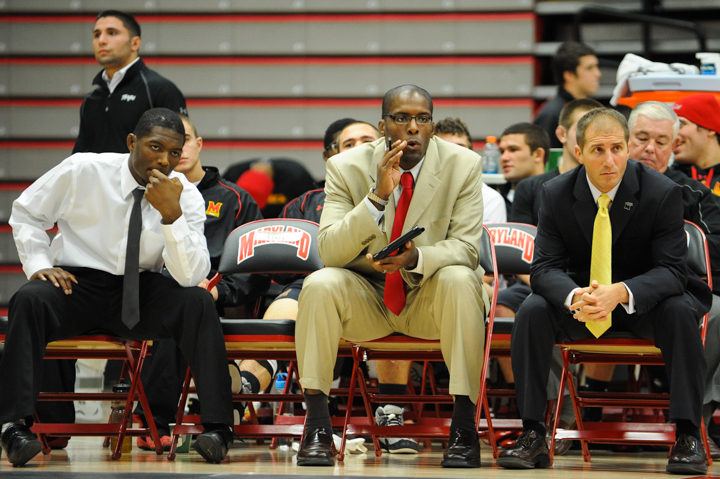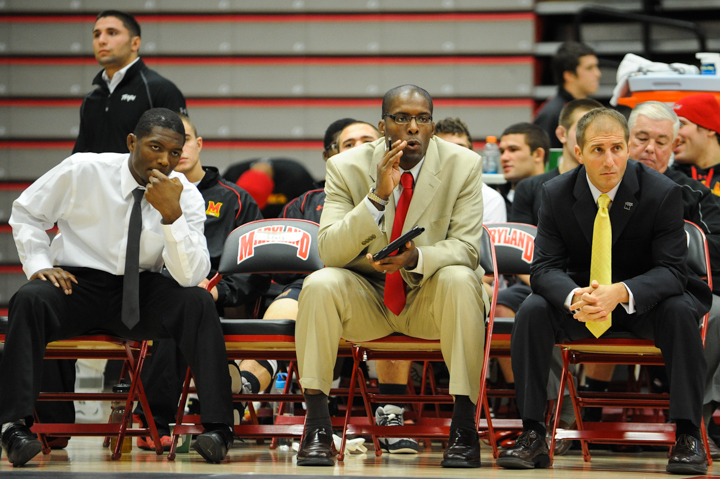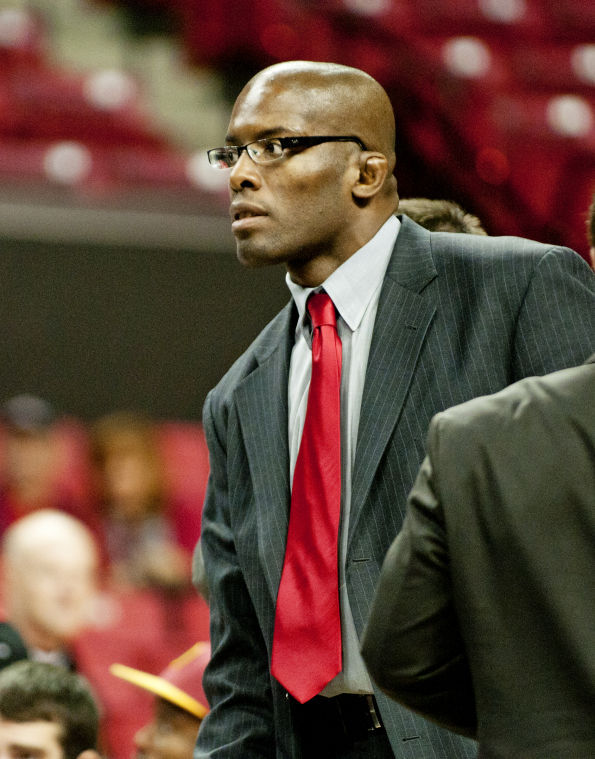THE 5-YEAR-OLD WAS LYING LIMP IN THE STREET, tears rushing down his face as his horrified cousin looked on. A friendly race home from the bus stop had gone terribly wrong, and the car that smashed into Kerry McCoy had driven away from the scene.
“It looked like my cousin jumped over the street,” McCoy said. “And they were like ‘No, that was you getting thrown through the air.’ I was upside down.”
McCoy spent the next eight weeks in the hospital, healing numerous broken bones. But he didn’t mind spending his summer cooped up in a hospital room, unable to play in the warm weather. Rather, he savored the chance to lie in bed all day, watching television and drinking ginger ale. He said he was “in heaven.”
“I remember thinking it was the coolest thing,” McCoy said. “I had this little buzzer, and at any time I could buzz it and a nurse would come.”
In his life, the Terrapins wrestling coach has made a habit of turning negatives into positives. Never one for self-pity, he regularly has redefined improbable tasks as new challenges or opportunities for growth.
He didn’t begin wrestling until the seventh grade, much later than some of his peers. Inexperienced and clumsy, McCoy’s coach enlisted him to wrestle teammates who were having bad days. McCoy was unaware that he was known as the “confidence builder.”
When he graduated from Longwood High School in Middle Island, N.Y., five years later, McCoy had more than left that reputation behind. The 1992 state champion was headed to Penn State on a wrestling scholarship. He won two NCAA Championships with the Nittany Lions and later became a two-time Olympian.
When he finally stepped onto the mat in Sydney for the 2000 Olympic Games, McCoy was achieving a dream that seemed nearly impossible when he first entered a wrestling room.
“No one can ever take that away that I was there,” McCoy said.
But on Feb. 12, 2013, the International Olympic Committee almost squashed that dream for future wrestlers, eliminating the sport from the Olympics. McCoy spent the next seven months working with The Committee for the Preservation of Olympic Wrestling, getting the sport reinstated by September.
For the first time in his life, McCoy was faced with a task that might have been too daunting to overcome.
“I think it would have really destroyed wrestling as a whole,” McCoy said.
***
MANY ELITE WRESTLERS BEGIN THEIR CAREERS before their elementary school graduation ceremonies, learning techniques and grappling styles at about the same time they first learn to ride a bike.
But growing up in Middle Island, McCoy didn’t start wrestling until middle school. He and his friends played basketball in front of his house, occupied for hours by their makeshift hoop with a plywood backboard.
When he first attended wrestling practice in seventh grade, McCoy was surprised to see that amateur wrestling was very different from televised professional wrestling.
“I thought wrestling was what you saw on TV,” McCoy said. “WWF. Hulk Hogan. So I had no idea what to think. I had no clue what amateur wrestling was. I go in and I see the mats on the floor, and I’m thinking its gymnastics practice or something.”
The coach told the kids to start running. McCoy was confused, but he began jogging anyway. As that first practice wore on, he eventually warmed up to the sport.
“That day, don’t know why, I fell in love with it,” McCoy said. “[I said,] ‘I’m going to do this for a long time.’ There was never a question for me of if I’m going to stick with it.”
Still, McCoy was raw, and he had a lot of learning to do.
“I was so bad,” McCoy said. “I was one step being above being able to walk and chew gum at the same time. I felt I was a good athlete, but when it came to wrestling, I was just terrible.”
When his coach would ask him to wrestle with struggling teammates, McCoy said he’d “get thrashed and thrown around.”
But he benefited from helpful teammates. He fondly remembered training with a friend named Anthony Camisa, who took friendly, backhanded jabs at McCoy.
“He’d kick my butt for an hour,” McCoy said. “Then he’d be like, ‘Let’s work on this.’ Then he’d say ‘You know you’ll never be able to beat me, so I don’t know why I’m even helping you out.’
“I was that stupid kid who didn’t know any better. I’m the kid that always kept coming back.”
***
MCCOY’S PASSION FOR GRAPPLING TRANSLATED INTO A DRAMATIC TRANSFORMATION in eighth grade, as he posted a 7-1 record. The next summer, he qualified for the state team and trained with the area’s top competitors. He went undefeated on the junior high school team that year.
After his sophomore season, McCoy qualified for the state team again. He finished second at the national tournament, but the first-place finisher didn’t want to compete in the world championships. So McCoy took his spot in the tournament and finished second, four years after he first stepped onto a wrestling mat. He competed in Russia again the next summer.
“In that swing between my freshman year through my junior year summer, I had so much experience in wrestling — international experience, national experience — that really propelled me,” McCoy said.
By his senior year, he was far removed from his status as the squad’s confidence builder. He carried the state’s top ranking in another unbeaten campaign, concluding his run with a high school state title and a junior world championship in the summer.
In addition to his success on the mat, McCoy was a stellar student and the president of his class. He was courted by elite schools such as Columbia University and Harvard University.
But when he met then-Penn State coach John Fritz in December of his senior year, those plans changed. Fritz was scouting another wrestler at Longwood when he noticed McCoy. Impressed by the gangly senior’s extensive prematch preparation, Fritz inquired about McCoy’s college plans.
“My first impressions of him were so furious, so passionate about it,” Fritz said. “That was the first time I really met him. Then, we started the recruiting process. Fortunately, we got him to Penn State.”
***
MCCOY RODE A 19-17 RECORD TO AN NCAA TOURNAMENT BERTH his freshman season. But after losing two of his first three matches, he was eliminated and his season was over.
After the match, Fritz saw McCoy grimacing in the bleachers, sitting by himself, watching the rest of the tournament unfold.
“I don’t ever want to feel this way again,” McCoy told Fritz. “I’m never going to lose another match.”
Fritz added: “You could see it in his eyes. He really meant it. He made up his mind.”
McCoy put on a substantial amount of weight for his next season, moving up from 190 pounds to 275 pounds. Motivated by his freshman campaign, he worked tirelessly in pursuit of perfection.
In addition to McCoy’s new physique, Fritz said that he noticed a distinct difference in McCoy’s will to succeed.
McCoy dominated the Big Ten, amassing a 39-0 regular-season record, and he fared better at the NCAA tournament. This time, he wasn’t relegated to the bleachers for the championship match; he was competing in it.
McCoy defeated Justin Greenlee in the finals by fall to win the NCAA heavyweight championship.
“To see him get that national title, I just remember [was] one of the greatest feelings, especially for Kerry, because you know how much he put into it, and how much sacrifice, and how determined, after all the tough things that he went through,” Fritz said. “It’s hard to explain, but anybody that’s coached knows, [there’s] so much more gratification to see someone like Kerry get that.”
Rather than take time to celebrate the momentous victory, however, McCoy set his sights on qualifying for the national team.
“He wanted to be the best,” Fritz said. “He wanted to be the best he could every time out there. He just devoted himself to that.”
After he failed to earn a spot on the United States squad, he shifted his focus back to training for his junior year. But now, with a national title to his name and two years of college eligibility remaining, McCoy’s celebrity skyrocketed.
Some made comparisons between McCoy and Dan Gable, owner of an NCAA record 98 straight victories, and to add to his fame, McCoy was featured in Sports Illustrated.
“It was [the] countdown to Gable,” McCoy said. “There was a lot of hype around it.”
The junior once again bulldozed through the regular season and the Big Ten tournament, entering the NCAA tournament at 38-0. But when he reached the semifinals of the national tournament, he found himself on the wrong end of an unlucky call.
McCoy had beaten his opponent three times in three previous tries, so he had a game plan. He took a 2-1 lead into the final period before he said he gave up a “controversial takedown” which made the score, 3-2. McCoy ended up losing the match, 4-3, after he was unable to mount any offense down the stretch, ending his winning streak at 88.
“That was probably the most devastating loss of my career,” McCoy said.
But McCoy didn’t to let the demoralizing defeat affect him too much. He decided to redshirt and train for the 1996 Olympic team. He came within one victory of qualifying.
With even more seasoning under his belt, McCoy returned to State College, Pa., with one final objective: ending his esteemed college career with another NCAA title. And, after a 43-0 campaign, he did just that.
Finally, after five wild years in which McCoy transformed from an inconsistent freshman alternating improbable victories with depressing losses to a dominant heavyweight, he ended his Penn State tenure standing on a podium with NCAA Championship hardware in hand and plenty of valuable experiences in tow.
“There’s something about going out with a national title,” Fritz said. “In Kerry’s case, after that tough loss before that, to come back, I think it said something about his fight.”
***
ENTERING THE 2000 OLYMPIC GAMES IN SYDNEY, McCoy was widely considered to be the favorite to take home the gold medal. And, if the opportunity presented itself, the two-time NCAA champion considered parlaying the experience into a career in televised professional wrestling.
Kurt Angle, who defeated McCoy to qualify for the 1996 Olympics, ended up winning a gold medal and later joined the WWF. McCoy said he and Rulon Gardner, a teammate on the 2000 team, hoped to win gold medals of their own and follow Angle to the professional wrestling world.
But before determining his career path, McCoy had a goal to achieve. Engrossed by the possibility of winning a gold medal, McCoy didn’t pay much attention to the Olympic atmosphere.
“I didn’t get to enjoy the Olympic Games for the Olympic Games,” McCoy said. “I tell people I was in Australia for two-and-a-half weeks, and I didn’t see a kangaroo or a koala bear.”
Despite the years of training and hype, McCoy came up short, finishing in fifth place. He looked on as wrestlers he had beaten in the past earned medals.
“I felt like everything was in slow motion,” McCoy said. “I was just in a dead space. I couldn’t hear anything, couldn’t see anything. … There was nothing worse in the world than me not getting to win a gold medal.”
McCoy wandered around Sydney by himself for two hours that night, blowing off ceremonies and parties. The next day, he boarded his flight and returned to the United States. The star heavyweight was done with wrestling. He planned to attend graduate school and get an master’s of business.
But as time wore on, McCoy couldn’t seem to distance himself from the sport. He agreed to compete at the 2001 World Championships in New York. The opportunity to win in his home state proved too enticing for McCoy to pass up.
The events of Sept. 11, 2001 put a halt to the planned event, delaying McCoy’s farewell tournament. Still, he kept in shape and stuck around the sport, serving as an assistant coach at Lehigh.
In April 2002, he competed in the World Cup, an event that in which wrestlers on the brink of retirement usually compete. But after winning the tournament, McCoy re-evaluated his decision to step away.
So with the Olympic trials in 18 months, McCoy put his graduate degree plans on hold. At 29 years old, he elected to try for Olympic gold again.
But once again, McCoy came up short on the sport’s biggest stage, earning a seventh-place finish in the 2004 Olympics in Athens, Greece. This time, he was really done.
***
ON FEB. 12, 2013, THE INTERNATIONAL OLYMPIC COMMITTEE RULED to drop wrestling from the Olympics beginning in 2020. The sport that been staged at the Olympics since 708 B.C. was to be no more.
“I thought somebody was kidding me,” Fritz said. “I really did think it was a joke.”
By 11 a.m. that day, The Committee for the Preservation of Olympic Wrestling had been formed, and McCoy was on it. For the next seven months, the committee had weekly conference calls.
“Through that seven months, it was scary,” McCoy said. “It was really scary, knowing that hundreds of thousands of boys and girls could potentially not have the opportunity to pursue their dreams.”
The sport’s absence from the Olympics would lead to a drop in popularity. The Olympics are the sport’s apex, the pedestal all wrestlers strive toward.
“The Olympics aren’t about winning,” McCoy said. “They’re about everyone coming together, representing their flag under the umbrella of sport.”
On Sept. 8, McCoy attended church with his family. He turned his cellphone off and tried to pay attention to the service, but he couldn’t concentrate. Just minutes into Mass, he walked into the hallway and checked his phone for an update.
Wrestling received 49 votes, 25 more than baseball and softball, ensuring it would be staged until at least the 2024 Olympics. After seven tireless months, McCoy and the wrestling committee had saved the sport.
“In those seven months, when I look back afterwards,” McCoy said. “I didn’t sleep real well. I wasn’t as focused. I got stuff done, but everything was kind of like a blur for those seven months. And I realized after, I just felt like that weight had been lifted. It really affected me in ways that I didn’t realize.”
***
ON WEDNESDAY, MCCOY WORE A READ TERPS POLO SHIRT as he sat with folded legs at a desk in his Comcast Center office, telling the story of his improbable voyage from hospital bed-ridden 5-year-old, to middle school benchwarmer, to two-time Olympian.
On June 22, McCoy will join the sport’s greats in the Wrestling Hall of Fame, further cementing his status as one the most renowned wrestlers of all time. For someone who once confused wrestling mats with gymnastics equipment, it’s an immense honor.
“It’s unbelievable knowing that I’m going to be in the Hall of Fame,” McCoy said. “I tell a lot of people that if a skinny kid from Middle Island, N.Y., could do this, than anybody could do it.”
McCoy’s life has been a series of trials. Yet, one by one, when it came to wrestling, McCoy has conquered them all. A high school state championship. Two NCAA Championships. Two Olympic teams. And, maybe, most importantly, he helped restore the sport to the Olympics.
“Every stage of my career, when I started, I got smashed,” McCoy said.
It’s something he’s been doing since he was struck by a car when he was 5 years old. Now he faces new challenges: coaching the Terps and parenting his two children.
While McCoy said that he isn’t overtly pushing his son toward following in his footsteps, 5-year-old Gabriel has a wrestling mat in the basement, albeit covered with his train set.
“If you look at his son,” said McCoy’s mother, Gretchen Cisco. “You’ll see him.”
McCoy’s office is decorated with old memorabilia, VHS tapes of former matches and inspirational quotes. His favorite memento is a sign his former trainer gave to him.
The paper reads: “If God is for me, Who can Be against Me?”
Strolling up the stairs earlier that day, McCoy ran into a co-worker who asked him how he was doing. His team had recently wrapped up a fifth-place finish at the ACC tournament, a disappointing finish by McCoy’s standards.
“Not going to complain,” McCoy said. “Doesn’t do you any good to do so.”
Coach Kerry McCoy gives directions to the Terps during a meet on Nov. 3, 2013 at Comcast Center.





